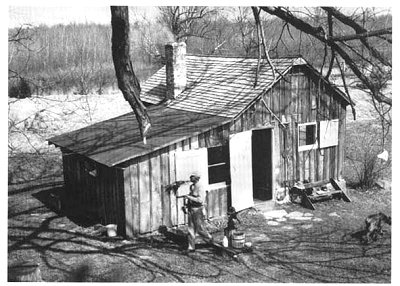video
Aldo Leopold is the next important thinker about wilderness. He brought in both science and ethics.
Leopold started out as a forester, trained in managing timber but interested in game management
He came to an increasing interest in wilderness and ecology
Greatest Good ch. 17 (part 2 ch. 5)
(watch out--so far we have been talking about how different people have different ideas of wilderness, but in this case we can't ignore how one person's ideas changed over the course of his life)
Aldo Leopold
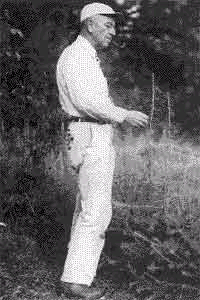 Leopold
was
trained
in forestry at Yale
and went to work for the Forest Service
in the southwest in 1909
Leopold
was
trained
in forestry at Yale
and went to work for the Forest Service
in the southwest in 1909He developed the field of game management--how to manage hunting and stop poaching to maintain population of animals for hunters to hunt--looked at game as a crop
1. he tells the story of killing the mother wolf and seeing the green fire die
2. also reduced number of predators meant increased numbers of grazing animals led to erosion problems
By 1919 he was thinking not just about game but about wilderness
there isn't yet land set aside as wilderness strictly defined
--The National Parks had hotels and roads
--The Forest Service harvested timber, though only as much as grew
Meanwhile the Forest Service, not wanting to be outdone by the new Park Service, was thinking about managing National Forests for recreation, not just for timber production
Multiple use: forests can be used for timber production, watersheds, and recreation at the same time
Leopold wrote an article in the Journal of Forestry in 1921 calling for designated wilderness areas and defining wilderness as "a continuous stretch of country preserved in its natural state, open to lawful hunting and fishing, big enough to absorb a two weeks' pack trip, and kept devoid of roads, artificial trails, cottages, or other works of man."
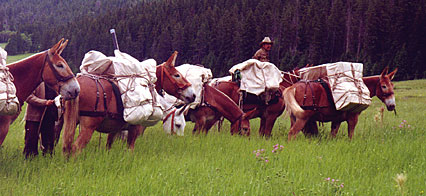
loaded mules on a pack trip
Gila
Wilderness
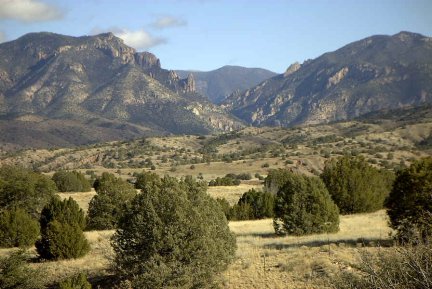 In 1924, 574,000 acres of the Gila National
Forest in New Mexico were designated for
wilderness recreation
In 1924, 574,000 acres of the Gila National
Forest in New Mexico were designated for
wilderness recreationIn 1929 the Forest Service approved an official policy for preserving wilderness areas
After that Leopold took a job as assistant director of the Forest Service's Forest Products Laboratory and began to think about how to justify wilderness
Like Thoreau he wanted a balance between wilderness and civilization
He argued that what makes American culture unique is: "a certain vigorous individualism combined with ability to organize, a certain intellectual curiosity bent to practical ends, a lack of subservience to stiff social forms, and an intolerance of drones, all of which are distinctive characteristics of successful pioneers." With the frontier gone we need to save wilderness areas where these characteristics can be cultivated.
Leopold moved on to be a professor at the University of Wisconsin, and there his thinking changed further
- Land as an organism--his way of talking about a healthy ecosystem, as the idea of an ecosystem was just being developed
- Leopold called for a new ethics: the environment is a community to which we belong and to which we owe respect
- took from Albert Schweitzer the idea that the foundation for ethics should be "a reverence for life."
- Leopold translated religious ideas about wilderness into ethics and added science
- organized shared
ideas
(systems)
about what is right and wrong (different from
personal morality)
- utilitarian
ethics--the
right thing to do is based on the greatest good for the
greatest number
of people
- rule-based ethics (deontological)--based on rights or rules, for example base your ethics entirely on the Ten Commandments
- all of this starts with what is good for human beings
- what would the basis
be for
ethics broader than just human beings?
- you can't base ethics just on gut feelings, so what do you base it on?
- one common basis for
ethics
is the golden rule: treat other human beings as you
would want to be
treated
- Leopold expands that
beyond
human beings to all living things
- "A thing is right when it
tends
to
preserve the integrity, stability, and beauty of the
biotic
community. It is wrong when it tends otherwise."
Leopold's
statement of the Land Ethic
- Leopold said that at first people only felt an ethical responsibility to their own family. Later they felt a responsibility to the whole community, but not to slaves and foreigners. Finally ethics was expanded to include all human beings. Now it should be expanded to include all living things.
- this provides a clearer argument for preserving wilderness
Ecology:
- a new field of science in the 1930s and 1940s
- looks at the system
rather
than the individual species
- ecology provided the idea that nature was an intricate web of interdependent parts, each essential to the healthy operation of the whole (Nash p. 195)
- takes us beyond the charismatic megafauna--just caring about animals we find exciting to look at
- ecology teaches us that plants and animals depend on each other in such intricate ways that we need to preserve whole ecosystems
- how do you study
ecosystems?
- wilderness needed to be preserved for scientific study also
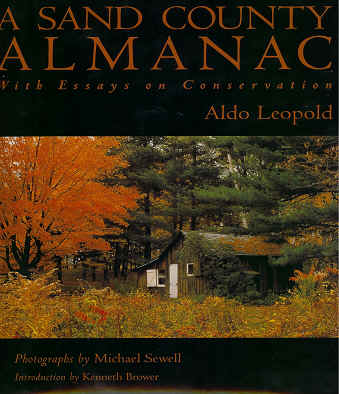
Wolves
- in the early 20th century the game management approach of the Forest Service was to try to eradicate predators like wolves
- wolves were extirpated from the lower 48 states except for Glacier National Park
- the development of ecology leads people to see predators as a valuable part of the ecosystem
- in the 1990s wolves were reintroduced into Yellowstone National Park
- they have been very successful and now hunters and ranchers complain
- controversy
continues today
This
page written and copyright Pamela
E. Mack
